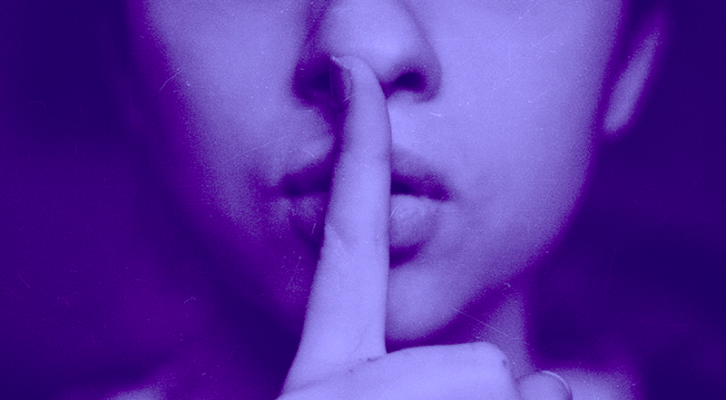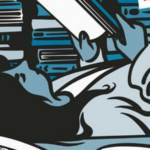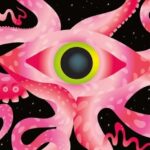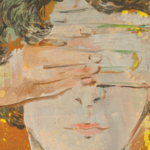One of the joys of reading a book by Megan Abbott lies in the witchy spell she casts over you as a reader. Her most recent novels, from 2011’s The End of Everything to this year’s Give Me Your Hand, dance tantalizingly on the edge of psychological thriller territory, but inhabit an unsettling ground all their own. As Abbott has shifted smoothly from her noir and hard-boiled novelistic beginnings, she’s beguiled readers into insular bubble-worlds of suburban and small-town America—specifically into the hearts and minds of teenage girls and their families— where shared interests such as cheerleading, gymnastics, and even mass hysteria are what bind communities together, for better and for worse.
In Give Me Your Hand, two girls, Kit and Diane, initially bond over a Marie Curie quote and cross-country running, and then over secrets, teenager-style. One secret in particular will reverberate into adulthood, keeping them locked in an ongoing competitive relationship that has far-reaching repercussions, deep in the world of science-research laboratories. “I’m really interested in insular subcultures, that’s my weird speciality,” Abbott agrees. “I don’t plan on it, I just seem to end up there. Those settings, they seem to bring out the strangeness of people. I approach it almost anthropologically at the start, but then I get very fascinated at the extremes of emotions. They’re kind of hothouses, I guess, and no one’s measuring themselves. We spend so much of our lives wearing masks and performing in some ways and measuring our responses; I get the feeling, the places I like are where all the masks are off.”
For her latest novel, Abbott read science memoirs and biographies as well as interviewing scientists. “I really wanted to understand—this is how basic my science was—when you’re standing in a lab, what are you actually doing? I was talking to this scientist about it, and she started telling me about lab culture, not just how competitive it is, but how it can become like this snake pit or this Lord of the Flies thing. Because you’re isolated and together in this bubble; you are all working together and also competing against each other, and personalities can really weigh on each other. There were all the stories about what they call labotage, sabotage in the lab! I had a glancing awareness of it, but I didn’t realize how extreme it could become. And that just really seemed so interesting, especially for women who often find themselves the only woman in the lab.”
Three statements ricochet and vibrate through the book’s pages, effectively underpinning its chilling atmosphere. One is stated by the narrator, hit by a sudden realization, “[A] clue to a mystery I didn’t know I was in”; one turns on the double-bind aspect of secret-telling: “’By telling me, you trapped me…’ ‘By telling you…I was free’”; and one sears through the novel from its earliest pages, that aforementioned Marie Curie quote: “My head is so full of plans that it seems aflame.”
“That quote, I didn’t have that before the book,” says Abbott. “I was developing the book and reading for quite a while, just trying to get my mind around the science part of it. At first, you know, I didn’t even know what world it would be in, because I started with a teenage story. I had done so much with sports, so I thought, ‘I can’t do sports again.’ One of the reasons I liked to write about sports and physical stuff is that there’s something very visual and visceral; it’s very dramatic. So, the challenge was, how can I make the cerebral aspects of science feel exciting and harrowing? I wanted to figure out how to connect to that. So I was reading a lot of female scientists and about female scientists. That quote—well, among other things, Marie Curie fascinated me as a complicated, passionate woman and such an excessive worker and that just seemed perfect for the way that Kit and Diane lit this fire inside each other. Something gets sparked that’s both powerful and dangerous; that quote is so much about how being really good at something and wanting it very badly can be so consuming.”
The perception that sharing a secret can make one person feel better and the other person feel so much worse, that came even earlier in the writing process, says Abbott. “I kind of stumble into everything in terms of ideas,” she explains. “When I’m deciding what the next book is going to be, I usually have three or four things I’m playing around with and it always starts with something very small. With Give Me Your Hand, it was this weird notion of sharing secrets, that sometimes it’s like you pass this infection along.”
As for the “clue to a mystery I didn’t know I was in” quote, that leads appropriately enough to David Lynch. “I do think about Blue Velvet a lot,” says Abbott, “the Kyle MacLachlan character peeping through the key hole. It’s so clear that he’s the good guy but he has darknesses too, and he wants in—he really does want to be part of the mystery. And once he’s in it, it’s too late. I don’t think Kit wants in in the same way, but she keeps being compelled to return in some way to Diane’s force of personality, and I think that there’s that push-pull in all of us, that attraction to darkness. No one really knows what they would do in certain circumstances so we usually try to avoid getting into those circumstances”—at this point Abbott laughs in a distinctly un-Lynchian way—“but I think, too, it’s not always clear that you’ve entered them. It’s almost like a labyrinth, right? Like a maze, like in The Shining where you’re just walking and all of a sudden you’re in the center of this labyrinth you know it’s a choice of how active you’re going to be in the act of getting out—or how passive you’re going to be.”
But while Abbott is fiercely adept at limning her characters’ darkest corners, she is equally versatile at injecting the kinds of details into her writing that make her tales shimmer to life. In conversation, she is engagingly inquisitive and funny, with a pleasing sense of wonder threaded through her thoughts, an impression not too distant from the one you might get from her social media accounts which feature generous appreciation of fellow writers, inspired quotes and images from the Golden Age of movies, and photos of found objects, including a series that captures the recyclables spot outside her building. “My dad and I used to go trash-picking when I was a kid,” Abbott says, acknowledging a lifetime of found-object interest. “It was just something we’d do in the evening—walk around and see if people threw out anything good. When we saw stuff he’d say, “Trash or treasure!” We’d find record albums and old toys, and the rule would be you’d take them home and clean them, put the disinfectant on, and then it would be ours. It always had the feel of a treasure hunt: if we were in the woods we would be looking for cool things in nature, but because we were in the suburbs we were looking for trash. We loved it.”
In her books, Abbott scatters her own pieces of treasure, dropping nuggets of cultural gold and allowing a canny collection of the familiar and the nostalgic to light your way to her characters and into their lives. Give Me Your Hand, for example, includes references to the “green bottles like grenades” of Mickey’s wide-mouth beers, Jean Naté, Mr. Bubble, Juice Newton, and the 1997 documentary Hands on a Hard Body. Abbott, whose childhood reading fodder included the Encyclopedia Brown, Betsy-Tacy, and Great Brain series, The Archies, V.C. Andrews, Lois Duncan, Judy Blume, and Jacqueline Susann, appears hard-wired into selecting just the right object or name with which to elicit an instantaneous rush of empathetic recognition. “Those choices are almost always organic,” she says. “When it’s not I end up cutting it because it feels forced. Usually it’s more sensate for me. I’m trying to help the reader see or hear or feel something, so I want something really specific, and I try to make it a thing where if you know it, it’s gonna be this great flashback for you, but even if you don’t, the way I try to describe it also feels very vivid. It’s an immersive quality I’m always trying to go for, and I spend an inordinate amount of time trying to get those right.”
Recently, Abbot has also breached the world of television writing, developing some of her own novels as well as writing for HBO’s The Deuce. “It’s a little harder with your own stuff because you have to separate your own vanity and pride from what will make a good show and you have to take constant feedback. But watching David Simon and George Pelecanos taught me that you really have to stick to your guns, you know? At times, you do feel like everything can easily turn to cliché; it’s really easy to lose your original voice. And it’s not that anyone wants that to happen—that edge, that freshness is why they were interested in the work in the first place. It’s more like a slow drift where things are getting a little off, a little less risky. So maintaining that original aspect has been the real battle; you’re constantly having to defend your choices to other people and to keep it original and authentic. That vigilance is not something you experience with writing novels—it’s your book, it’s really between your editor and you.”
The conversation takes a bit of a free-ranging quality as we discuss Lauren Groff’s women-focused By the Book interview —“there was something thrilling about her going all the way with it”; Kate Atkinson—“She just knocks me out, her fearlessness as a writer. She has such confidence and she’s not trying to please anyone and you can feel that. The effect is so dazzling”; and an early love of Abbott’s, Emily Brontë’s Cathy. “She really was the first character I came across that was really complicated,” Abbott recalls. “She didn’t sit in any easy category. I couldn’t understand why she was doing the things she was doing but I loved it. Emily Brontë was so ready to go into these subterranean places of the brain and the heart—I do see those characters who can’t fit in tidy categories, they really entrance me.”
We were speaking the day after the news of Anthony Bourdain’s suicide had broken, and Abbott had spent the previous evening with her crime-fiction community at a local Noir at the Bar event. “He was the topic of much conversation,” she said, “and it was one of the reasons a bunch of us went out for beers afterwards. He obviously was an important cultural figure to many. My friend Bill Boyle was reading last night; we were on this Parts Unknown episode that they did in Mississippi—I was living in Oxford at the time. It was just good to all be hanging out and talking about him and talking about his love of crime fiction, his own crime fiction. It just felt like a much better way to end such a sad day.”
In an interview that touched on so many books, I had one more question for Megan Abbot, the reader, about her recent response to a public query on Twitter: “What’s been…one of your favorite moments/periods of engagement with a book? Situations when the actual circumstances of reading it enhanced your appreciation of the book, or in some way proved memorable?” “Burrowing deep inside Hanya Yanagihara’s A Little Life,” Abbott replied, “amid a time of big changes and heartbreak and, finally, hopefulness.”
“I don’t even remember what the specifics of it were,” Abbott says now. “When I read that, it was like a fever dream, reading it straight through. That’s a huge book and I probably read it in a day and a half. I think I had a heightened awareness of something to do with things ending: it was a little bit to do with New York because it’s such a New York book; and it was sort of this sense….it happens a lot in New York that people are always leaving because they can’t take it anymore. I had this flurry of people leaving, a lot of them going to LA, a lot of them going to the suburbs, and the sense of a moment passing. And I remember starting to read that book, and it’s this love song to New York and then it becomes so much about trauma, but in such a bold way. That book is so excessive that there are people I could not recommend it to, but I thought its excess was exactly its strength. It reminded me to never be safe as a writer and to continue to go into all those dark corners like she did. I also remember reading Jami Attenberg’s last novel, All Grown Up, right after the election,” Abbott continues without even pausing for breath. “I read that in a day and it was the only thing that got me through that day. I think books can really do that, you know? They’re a tunnel into a better space where there’s beauty and heartache and all this stuff, but it’s a place you want to be as opposed to when you shut the book.”
And there, right there, all I could think of in response was, “Yes.”

















